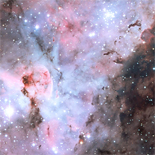Astronomy 301 - Fall 2010
INTRODUCTION TO ASTRONOMY
MWF 9-10 · WEL 3.502 · Unique No. 47635

Carina Nebula (ESO)
Professor
RLM 15.318 · TBA · (512) 471-6446 · email
Courses - Fall '10 | Course Website
The College of Natural Sciences does not in general honor the “one free drop” policy of some other colleges (e.g. Liberal Arts), so do not ask me for a Q drop after Oct 20 for academic reasons (e.g. because your grade is lower than you’d like), no matter what a counselor in your college may have told you. You need a substantiated non-academic reason. The only possible exceptions are first-semester freshmen who are allowed to drop a single College of Natural Sciences course--in that case there is a special form that I would need to see.
Incompletes: An incomplete (X) will only be considered for students who cannot complete the required course work for reasons other than lack of diligence (illness or other imperative nonacademic reasons), but only if the student has a passing grade on the work completed.
Cheating: Academic dishonesty will result in failure of the course and a report to the Dean of Students, who will decide on further action. Depending on the size of this class relative to the number of seats, you will be asked to sit at least one seat apart during exams. Also, bring your UT ID card with you to exams and be prepared to show this card if asked.
Student observing opportunities (schedule is tentative--see http://outreach.as.utexas.edu/public/viewing.html for official schedule and updates). Students interested in observing the night sky through small telescopes have several opportunities. 1. The Painter Hall Observatory has UT Student/Staff Night on Fridays from 9:30 to 10:30. Public Night is on Saturdays, 8:30 to 10:30. These sessions are free and open to all ages; no reservations are required. 2. The Astronomy Department sponsors weekly “Star Parties” on the 18th floor observing deck of R.L. Moore Hall 30 minutes after sunset (7pm, probably 6pm) on Wednesdays this Spring. This is free and open to the public. Call 471-5007 for a list of all Astronomy Department public events, since this schedule may have changed.
Course Description—Review this in detail as soon as possible after first class lecture hour.
This course is meant as a descriptive introduction to a wide range of topics in astronomy for students who are
not science or math majors. The emphasis in this course is on description of astronomical phenomena, how
astronomical observations are performed and interpreted, and theories for the evolution of various
astronomical objects. The mathematical level, it is nearly zero in this course--I do not believe manipulation
of formulas demonstrates understanding, so I try to equalize the background differences by using very little
math in lectures, and almost (not quite) none on the exams. However you will encounter a few important but
simple formulas in the text whose understanding will be helpful, even crucial, throughout later sections of the
course, so please don’t interpret this paragraph as suggesting that you should ignore the important equations!
You should also get used to seeing very large and very small numbers expressed in “scientific notation” (be sure to read Appendix 1 of the text, at the end of the book, or at the web site, on this; for example, “Our galaxy contains about 1011 stars.”). It will also be very helpful to develop a comfort with looking at graphs, if you’re not comfortable already. Comfort with scientific notation and graphs will greatly enhance the ease with which you comprehend concepts later in the course, and so I urge you to spend some time on these matters early in the course. However most of the emphasis in this class will be focused on a verbal-level presentation and understanding of the material.
The lectures will generally emphasize the most important and/or difficult topics covered in the text and attempt to clarify their connections. The lectures will not cover every topic covered in the text that you are responsible for, so don’t assume that if it’s not covered in lecture, it won’t be on the exam; I will tell you in lecture (and on review sheets before each exam) which parts of the text you can skip or are of minor interest. There are a (very) few topics to which I will add material not covered in the text, the more important role of the lectures is clarification of concepts and discussing the same material as in the book from different points of view, so that you do not get deluded by terminology. So you may find it a distinct advantage to attend classes regularly, especially since some of the exam questions will be taken directly from lecture material, and I am in the habit of asking questions during class that later magically appear on exams.